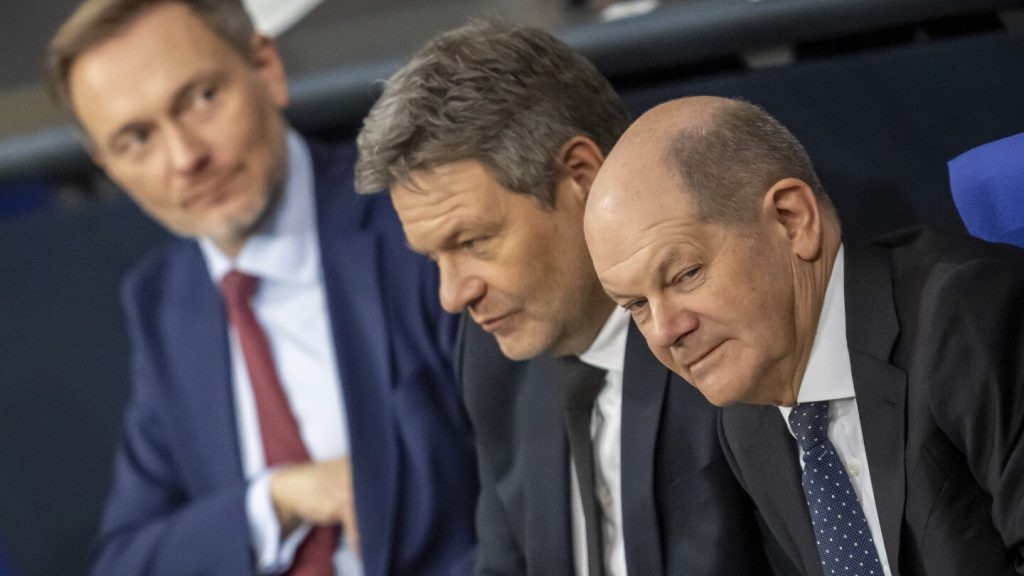German officials have rejected concerns about national budget constraints affecting weapons deliveries to Ukraine, as Germany is one of the country’s biggest suppliers after the United States. The government is looking at a $50 billion international loan package funded by interest on profits from frozen Russian assets to help ease the financial strain of providing military support to Kyiv. Reports over the weekend that aid financing could be impacted by Germany’s domestic budget concerns were criticized by some in the governing coalition, but Chancellor Olaf Scholz’s government is striving to balance the priorities of three ideologically different parties and adhere to Germany’s strict rules on debt. This year’s budget includes nearly 7.5 billion euros for military aid to Ukraine, with next year’s plan set at 4 billion euros, a figure that could increase as the budget goes through parliament.
The German government is hopeful that the loan package agreed upon by Group of Seven leaders in June will play a significant role in financing aid to Ukraine, allowing Kyiv to directly procure weapons. Interest earned on profits from Russia’s frozen central bank assets would be utilized as collateral. German government spokesperson Wolfgang Büchner expressed confidence that the system for this financing will be established by the end of the year. He emphasized that Germany has planned more support for Ukraine than any other European state, and as windfall profits from seized Russian assets become available, it is reasonable for Germany’s planned support to decrease in the future. The commitment to supporting Ukraine remains strong, with Chancellor Scholz affirming that aid will continue for as long as necessary, without any expectations of relenting from Russian President Putin.
A letter from Finance Minister Christian Lindner to the defense and foreign ministers, reported by German news agency dpa, indicated that any additional “new measures” for aid to Ukraine would depend on ensuring financing in the budget plans. However, the Defense Ministry spokesperson Arne Collatz expressed confidence that pragmatic solutions would be found for any short-term needs that may arise. The Finance Ministry also stated its readiness to consider additional requirements. Collatz and Büchner dismissed concerns that pledged deliveries of IRIS-T air defense systems might not be fulfilled. The German government is committed to finding solutions to any challenges that may arise in providing military support to Ukraine, and remains focused on upholding its commitments to aid the country during this challenging time.
In the face of concerns about possible budget constraints affecting weapons deliveries to Ukraine, German officials have maintained their commitment to supporting Kyiv and providing military aid. As one of Ukraine’s largest suppliers of weapons, Germany is looking at various financing options, including a $50 billion international loan package funded by interest on profits from seized Russian assets. The German government’s efforts to balance competing priorities and adhere to budgetary rules have faced criticism from some in the governing coalition, but officials remain confident in finding pragmatic solutions to ensure aid continues as planned. The commitment to supporting Ukraine for as long as necessary remains strong, with a focus on leveraging profits from frozen Russian assets to assist with financing military support in the future.
The German government’s plan to provide nearly 7.5 billion euros in military aid to Ukraine this year and 4 billion euros next year demonstrates a significant commitment to supporting Kyiv in its defense efforts. By utilizing interest earned on profits from Russia’s frozen central bank assets as collateral for a loan package, Germany aims to alleviate some of the financial strain of providing military support to Ukraine. While concerns have been raised about potential budget constraints impacting aid deliveries, government officials have reassured the public that they are prepared to find solutions to any short-term challenges that may arise. With a strong commitment to continue supporting Ukraine, Germany remains focused on upholding its promises and providing assistance to the country for as long as necessary, in defiance of any hopes from the Russian president or others that aid will diminish.


